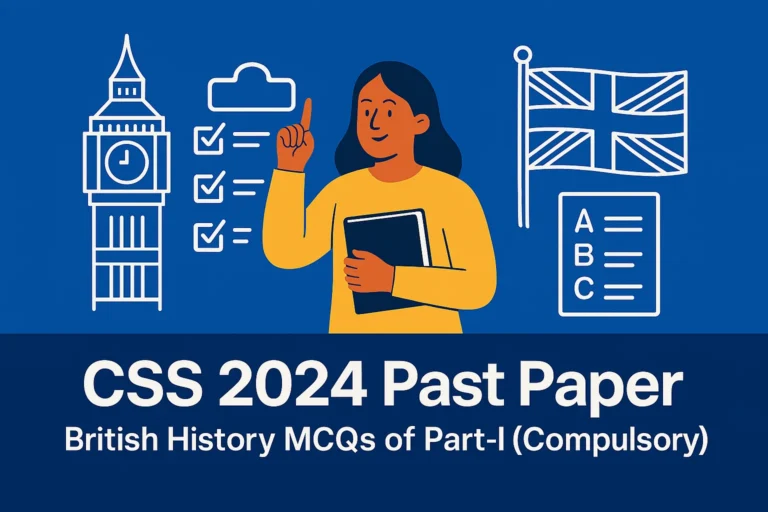Interdependence is a Higher Value than Independence
(English Essay – CSS & PMS)
Outline
- Introduction
- Importance of Interdependence in Modern Society
- Industrial and Economic Interdependence
- Social Interdependence and Class Coordination
- International Interdependence and Trade
- Foreign Exchange and Economic Dependence
- Foreign Aid as an Example of Interdependence
- Political Interdependence and Negotiations
- Pakistan’s Challenges and Need for Interdependence
- Interdependence in Times of Crisis
- Preserving Independence through Interdependence
- Conclusion
Introduction
Interdependence is considered a higher value than independence. Both values have their related importance in the life of nations. It is rather difficult to say which supports which. Interdependence and independence show a relationship which is complementary in the long run. However, in the present-day world, interdependence holds great importance both at the individual, national and international levels. It is highlighted in the paragraphs given as follows.
Importance of Interdependence in Modern Society
People in a society depend upon one another to meet their individual needs. No individual can claim to meet all his needs at a time from his own resources. Resources are far too inadequate to meet all needs at the individual level. Suppose it is intended to start an industrial project, involving a colossal amount of money, both in terms of rupees and the foreign exchange component. In that case, one may have to seek financial assistance from one’s friends and relatives to finance the project with a promise to return the amount by a certain date. One may have to borrow a loan from a bank carrying a certain amount of interest, without which financing of the proposed industrial project is not possible.
Industrial and Economic Interdependence
The modern industry involves huge financing, and banks provide loans to industrialists at a particular rate of interest. That is an aspect of interdependence between industrialists and banks, and that goes a long way to promote heavy, medium-scale industrialisation in developing countries, including Pakistan. The economic life of a community is thus dependent on a certain degree of interdependence. That equally holds well in the case of developed countries, where the main source of finance is the banking and other financial institutions. The present-day economic progress can be considered the result of interdependence between different organisations. Without interdependence, economic and social aspects of life can be adversely affected in a community.
Social Interdependence and Class Coordination
There are different classes in a society. It calls for complete coordination among them to keep the cycle moving. Life would come to a dead stop if labourers refuse to work in industries or, for that matter, if the industrialist resorts to lockouts. If the stalemate continues for long, the economic life would get paralysed, bringing the cycle of progress to a halt. If sweepers refuse to work, it would create an awkward situation, followed by the accumulation of refuse and garbage, resulting in the creation of unhygienic conditions in a society.
All classes must coordinate and cooperate to keep the cycle of life moving. A deadlock would be created if social and economic interdependence were to cease in a society. Hence, the need is to maintain and foster interdependence in different walks of human life.
International Interdependence and Trade
All countries – rich and poor – have to depend upon one another to meet their different economic needs. No country is self-sufficient in meeting all its needs at the same time. Countries have different natural resources. Some are rich in agriculture, while others enjoy a comparative advantage in mineral resources. Countries – developed or undeveloped – thus specialise in the production of commodities in which they have a comparative economic advantage. That is the basis of international trade.
The US or Western European countries, which are highly industrialised, have to depend upon the poor countries to get raw materials for turning them into finished products. No country, in short, is self-sufficient in meeting all its needs. The underdeveloped countries import heavy and light machinery from the developed ones to speed up industrialisation. The manufactured goods are sold to the poor countries at high prices, while raw materials are sold to the rich countries at low prices. It keeps the underdeveloped countries in a position of comparative disadvantage.
Foreign Exchange and Economic Dependence
It may be pointed out that independence, to a great extent, is necessary for promoting interdependence. If Pakistan wishes to import capital machinery for industrialisation, it must possess sufficient foreign exchange to pay for the machinery; otherwise, it would be restrained from achieving the objective. Countries lacking in the requisite amount of foreign exchange are obliged to contract foreign loans at high interest rates. The loans are to be repaid as per the terms and conditions.
The point worth noting is that countries desirous of importing capital, heavy machinery must have sufficient foreign exchange resources at their disposal. That presupposes the existence of foreign-exchange independence on the part of the poor countries to achieve the objective.
Foreign Aid as an Example of Interdependence
Foreign aid, whatever its merits and demerits may be, offers the example of economic interdependence. It comes to aid the poor countries to achieve investment-cum-foreign aid. Exchange-oriented objectives.
Aid, in many countries, where it was utilised productively, has gone a long way to give a boost to their economies. It is a different matter that aid in the long run involves the poor countries in a vicious circle of external debt. But no one can deny the interdependence aspect of aid. There is a need to increase the volume of aid, which should be 2 percent of the GDP in the developed countries.
Political Interdependence and Negotiations
There is a need to promote interdependence in the political sphere. Most of the disputes existing between countries can be resolved through dialogue and negotiations. The atmosphere of enmity tends to decrease when countries show a willingness to sit across a table to find a solution to the problems bedevilling their relations through negotiations.
That is why there is a need to restart the dialogue between India and Pakistan. The confidence-building measures need to be reinitiated between them at the highest level. The best way to preserve independence is to remove the bottlenecks that stand in the way of negotiations, for if hostilities are allowed to grow over time, then it might pave the way to confrontation, which could even create further complications, slamming the door to political reconciliation.
Pakistan’s Challenges and Need for Interdependence
Pakistan, at the moment, is threatened by the scourge of terrorism. The problem of looking after the internally displaced persons (IDPs) has assumed great importance. It is of colossal magnitude, which cannot be handled merely at the government level. Inter-governmental help is necessary to deal with the problem. Foreign governments are offering help in different forms to overcome the calamitous situation. Likewise, in case of national disasters like earthquakes, floods, inter-governmental help flows into the calamity-affected countries. It is an example of cooperation and interdependence between countries, which is meant to share the woes and problems of one another.
Interdependence in Times of Crisis
Home nationals, on such occasions, are seen coming to the forefront to share the burden of their brethren who are victims of nature’s fury and man’s aggression, terrorism, etc. People who have resources willingly donate them to promote a humanitarian cause. The NGOs and other social welfare-promoting institutions should mobilise their energies and resources to deal with the calamitous type of situation. The Government single-handedly cannot meet the abnormal situation. It calls for concerted efforts on the part of the different stakeholders to deal with the situation arising out of the internally displaced persons. Without interdependence, the situation cannot be handled properly.
Preserving Independence through Interdependence
In order to preserve independence, pragmatic economic and commercial policies are to be followed and implemented. The formulation of policies involves the participation of experts, ministers and bureaucrats. Policies do not exist in a vacuum, as these are to be evolved based on hard facts and realities. Policies, when implemented through the political will of the Government, yield fruitful results in the long run.
If policies are well-made, they become a source of sustenance to strengthen and consolidate the independence of a country. A number of national and international agencies are involved in the development efforts of countries. That shows the importance of interdependence as a value, holding great significance in the life of nations.
Conclusion
Let it be reiterated that interdependence and independence are two distinct values having their own relative importance in the life of individuals and nations. Independence can be greatly sustained through interdependence. The latter is instrumental to the preservation of the former.
The write-up ends with the saying of Aristotle, “A man who can live without other human beings is either a god or a beast”. That throws light on interdependence, which may be rated as a higher value than independence. Nations must learn the art of interdependence in the present era of globalisation.
Click here to find more articles on English Essay.






